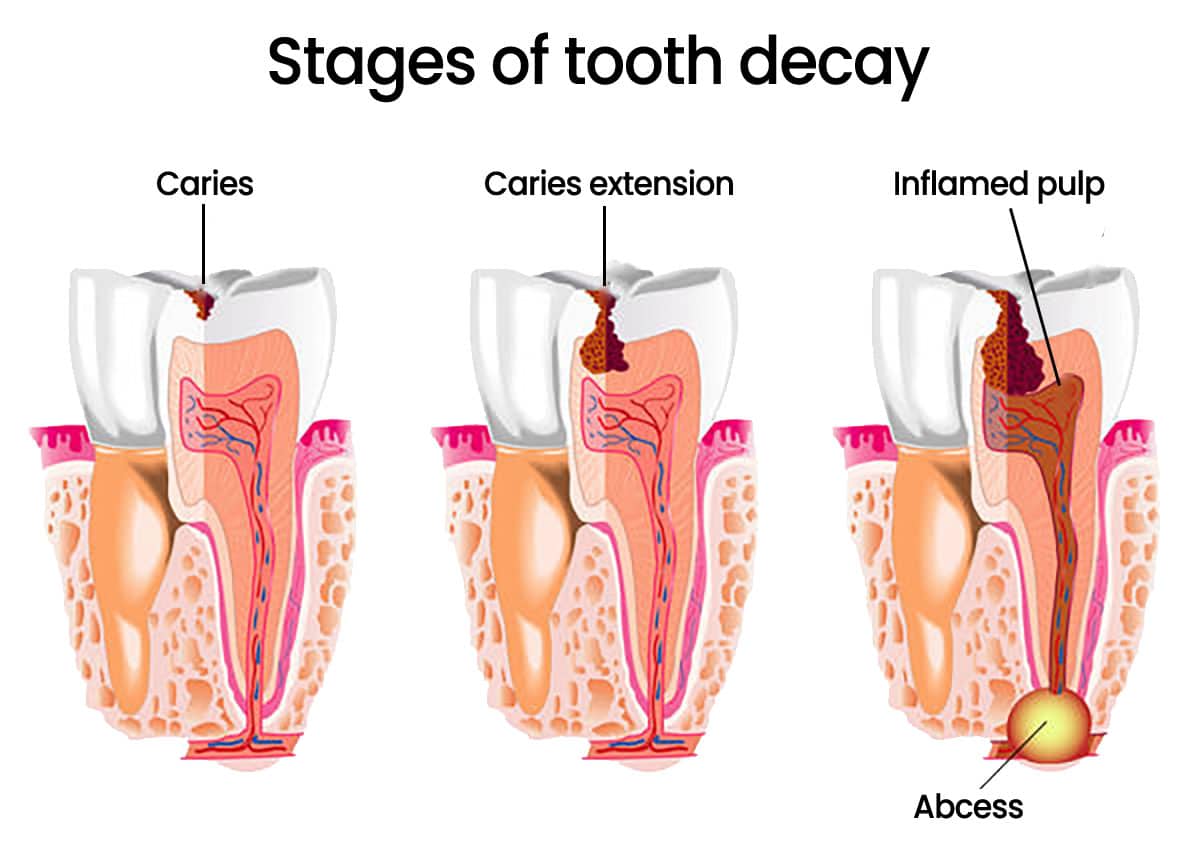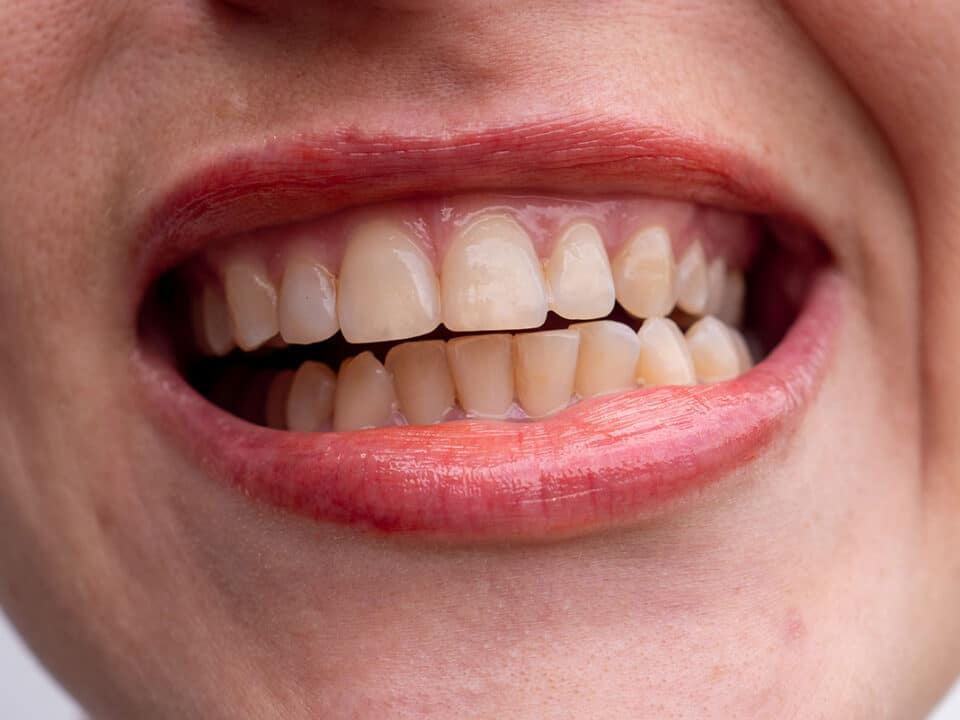Table of Contents
Overview
What is an abscessed tooth?
An abscessed tooth is a painful infection at the root of a tooth or between the gum and a tooth. It’s most commonly caused by severe tooth decay and occurs when bacteria are able to get inside and infect the center of the tooth (called the pulp). The infection may also spread from the root of the tooth to the bones supporting the tooth if left untreated.
Three distinct types of tooth infections can lead to the formation of abscesses:
Gingival: This infection originates within the gum tissues. It generally does not impact the tooth itself or the structures that provide support.
Periapical: A periapical abscess occurs at the extremity of a tooth’s root. When a tooth is decayed or fractured, bacteria can infiltrate the tooth, spreading to the innermost part, known as the pulp, containing nerves and blood vessels. The infection can then advance to the root’s tip and eventually extend to the adjacent bone, culminating in the development of an abscess.
Periodontal: This infection commences within the bone and the tissues that uphold the teeth. A periodontal abscess usually arises due to gum disease and tends to be more prevalent in adults.
This is what happens when a tooth abscess occurs:
Infection
An infection can develop when tooth decay or an injury exposes the innermost part of the tooth (pulp) to bacteria. The bacteria start to multiply within the pulp chamber, leading to inflammation.
Inflammation
As the infection progresses, the body’s immune response triggers inflammation to contain the infection. This inflammation can cause severe pain and discomfort around the affected tooth.
Pus formation
The immune system’s efforts to fight the infection result in the accumulation of pus, a mixture of dead tissue, white blood cells, and bacteria. This pus forms a pocket of infection within the tooth or at the root’s tip.

Is a tooth abscess dangerous to my health?
If untreated, the infection in your tooth can spread to the jawbone, which contacts the abscessed tooth. It can also spread to the soft tissues of your face, neck and even further. Oral infections can be dangerous because of the proximity to nerves, major arteries and the brain. In very rare cases, the infection from an abscessed tooth can get into your brain (bacterial meningitis) and your heart (endocarditis).
Symptoms & Causes
What Are the Symptoms of an Abscessed Tooth?
A severe and continuous toothache that results in gnawing or throbbing pain or sharp or shooting pain are common symptoms of an abscessed tooth. Other symptoms may include:
- Throbbing pain
- Sharp, shooting pain
- Radiating pain
- Fever
- Pain when chewing
- Sensitivity of the teeth to hot or cold
- Bitter taste in the mouth
- Foul smell to the breath
- Swollen neck glands
- General discomfort, uneasiness, or ill feeling
- Redness and swelling of the gums
- Swollen area of the upper or lower jaw
- An open, draining sore on the side of the gum
- Loosening tooth or teeth
If the pulp in the root of the tooth dies as a result of infection, the toothache may stop. However, this doesn’t mean the infection has healed; the infection remains active and continues to spread and destroy tissue. Therefore, if you experience any of the above-listed symptoms, it is essential to see a dentist even if the pain subsides.
What are the causes of an abscessed tooth?
Tooth abscesses are primarily caused by bacterial infections that penetrate the tooth’s inner structures or surrounding gum tissues.
Common causes
Dental decay
Untreated cavities or dental caries can allow bacteria to infiltrate the tooth’s enamel and dentin, reaching the pulp. This bacterial invasion leads to infection and abscess formation.
Gum disease
Advanced periodontal disease, characterized by inflammation and infection of the gum tissues, can create pockets where bacteria accumulate. These bacteria can then spread to the roots of the teeth, causing abscesses.
Dental trauma
Teeth that are cracked, chipped, or fractured due to injury or accident can provide pathways for bacteria to enter and infect the inner pulp, leading to abscess formation.
Failed dental procedures
Previous dental work, such as fillings or crowns, can sometimes fail or become compromised over time. Bacteria can enter through these openings, causing infection and abscesses.
Dental procedures
Certain dental procedures, such as root canals, may occasionally result in incomplete removal of bacteria or sealing issues. This can lead to persistent infection and abscesses.
Contributing factors
Poor oral hygiene
Inadequate oral hygiene practices can lead to the buildup of plaque and tartar, which can harbour bacteria. Over time, these bacteria can cause infections that lead to abscesses.
Immune system issues
A weakened immune system can make it difficult for the body to fight off infections, including those in the teeth and gums, increasing the risk of abscesses.
Other medical conditions
Some medical conditions, like diabetes, can contribute to a higher susceptibility to dental infections and abscesses.
Poor diet
A diet high in sugary foods and drinks can encourage the growth of bacteria contributing to tooth decay, increasing the likelihood of abscess development.
Diagnosis & Treatment
How Is an Abscessed Tooth Diagnosed?
Oral examination
Your dentist will examine your mouth, teeth, and gums visually. They will look for signs of swelling, redness, and tenderness in the affected area. Your dentist may also gently tap on the teeth to check for sensitivity, which can indicate an abscess.
Consultation
Your dentist will ask you about your symptoms, including any pain, discomfort, or changes you’ve noticed in your oral health. Providing details about when the pain started, its intensity and any triggers can help diagnose.
Probe test
Your dentist will probe your teeth with a dental instrument. If you have an abscessed tooth, you will feel pain when your dentist’s probe taps and presses the tooth. Your dentist will also ask if your pain increases when you bite down or close your mouth tightly. In addition, your dentist may suspect an abscessed tooth because your gums may be swollen and red.
Temperature sensitivity test
Your dentist might use a cold stimulus (such as a blast of air or a cold instrument) to test how your tooth reacts. An abscessed tooth often exhibits heightened sensitivity to cold.
Pulp vitality test
A pulp vitality test involves checking the response of the tooth’s pulp to stimuli. A reduced or absent response can suggest an abscessed tooth.
Dental x-ray or CT scan
Dental X-rays are a crucial tool for diagnosing an abscessed tooth. X-rays can reveal changes in the bone structure and detect infections in the roots of the teeth. They can also show the presence of pockets of pus and the extent of the infection. If the infection looks severe or has spread, a CT scan may be recommended to assess the extent of the infection properly.
How Is an Abscessed Tooth Treated?
If left untreated, the infection can spread to the surrounding tissues, including the jawbone, causing more serious health problems. Treatment goals for an abscessed tooth are strategies to eliminate the infection, preserve the tooth, and prevent complications.
Treatment for an abscessed tooth typically involves addressing the infection and relieving the pain. This may include:
- Draining the abscess to remove pus and infection.
- Root canal treatment to remove the infected pulp and save the tooth.
- Extraction of the tooth if it cannot be saved.
- Antibiotics to control the infection
Recovery & Outlook
How long does it take for an abscessed tooth to heal?
The time it takes for a tooth abscess to heal can vary widely depending on the severity of the infection, the treatment provided, and individual factors. Generally, with appropriate treatment, you can expect to experience relief from pain and see improvement within a few days to a couple of weeks.
Will a tooth abscess go away on its own?
An untreated tooth abscess does not resolve naturally. Pain might cease if the infection leads to the death of the pulp within the tooth, causing the nerve to become nonfunctional and the pain to subside. However, the bacteria responsible for the infection will persist, progressively damaging the nearby tissues. Even if the pain subsides, it’s imperative to seek dental attention for tooth abscess symptoms.
Prevention & Care
How can I prevent tooth abscesses?
The best way to prevent tooth abscesses is to keep your mouth clean by practicing good oral hygiene (brushing and flossing) and visiting your dentist regularly for cleanings and checkups. If you start to feel any tooth pain that doesn’t go away after a day or two, have your dentist check for damage or signs that an infection is starting.
What can I take for tooth pain caused by an abscess?
To help reduce the pain from an abscessed tooth, we advise you to rinse your mouth regularly with warm salt water and to take regular pain medications such as acetaminophen or ibuprofen. There are a handful of natural toothache remedies you could try as well. Remember, a tooth abscess will not heal itself, and It’s important to visit your dentist as soon as possible to get the issue taken care of.
When do I need to make an appointment with my dentist?
Anytime you experience a toothache, red, swollen or bumpy gums, or unexplained mouth pain – you should make an appointment to let your dentist take a look. Our Burlington Emergency Dentist can help if you need assistance right away.
When should I go to the emergency room?
An abscessed tooth would normally not be cause for a visit to the ER unless other symptoms are also present:
- A fever higher than 38 degrees Celsius ( 100.4 Fahrenheit)
- Your experiencing facial swelling
- You have difficulty swallowing
- Your heart rate remains elevated
- You feel confused or dizzy
Check us out on Facebook and Twitter for daily information about Oral Health from Martindale Dental, or visit our offices in Hamilton and St. Catharines.
Have more questions?
Please contact us for all inquiries or to book an appointment with one of our convenient clinic locations. We look forward to hearing from you.




